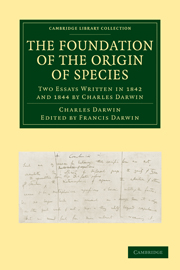Book contents
- Frontmatter
- Contents
- INTRODUCTION
- PART I
- PART II
- PART I
- PART II ON THE EVIDENCE FAVOURABLE AND OPPOSED TO THE VIEW THAT SPECIES ARE NATURALLY FORMED RACES, DESCENDED FROM COMMON STOCKS
- CHAPTER IV ON THE NUMBER OF INTERMEDIATE FORMS REQUIRED ON THE THEORY OF COMMON DESCENT; AND ON THEIR ABSENCE IN A FOSSIL STATE
- CHAPTER V GRADUAL APPEARANCE AND DISAPPEARANCE OF SPECIES
- CHAPTER VI ON THE GEOGRAPHICAL DISTRIBUTION OF ORGANIC BEINGS IN PAST AND PRESENT TIMES
- CHAPTER VII ON THE NATURE OF THE AFFINITIES AND CLASSIFICATION OF ORGANIC BEINGS
- CHAPTER VIII UNITY OF TYPE IN THE GREAT CLASSES; AND MORPHOLOGICAL STRUCTURES
- CHAPTER IX ABORTIVE OR RUDIMENTARY ORGANS
- CHAPTER X RECAPITULATION AND CONCLUSION
- INDEX
CHAPTER X - RECAPITULATION AND CONCLUSION
Published online by Cambridge University Press: 07 September 2010
- Frontmatter
- Contents
- INTRODUCTION
- PART I
- PART II
- PART I
- PART II ON THE EVIDENCE FAVOURABLE AND OPPOSED TO THE VIEW THAT SPECIES ARE NATURALLY FORMED RACES, DESCENDED FROM COMMON STOCKS
- CHAPTER IV ON THE NUMBER OF INTERMEDIATE FORMS REQUIRED ON THE THEORY OF COMMON DESCENT; AND ON THEIR ABSENCE IN A FOSSIL STATE
- CHAPTER V GRADUAL APPEARANCE AND DISAPPEARANCE OF SPECIES
- CHAPTER VI ON THE GEOGRAPHICAL DISTRIBUTION OF ORGANIC BEINGS IN PAST AND PRESENT TIMES
- CHAPTER VII ON THE NATURE OF THE AFFINITIES AND CLASSIFICATION OF ORGANIC BEINGS
- CHAPTER VIII UNITY OF TYPE IN THE GREAT CLASSES; AND MORPHOLOGICAL STRUCTURES
- CHAPTER IX ABORTIVE OR RUDIMENTARY ORGANS
- CHAPTER X RECAPITULATION AND CONCLUSION
- INDEX
Summary
Recapitulation.
I will now recapitulate the course of this work, more fully with respect to the former parts, and briefly 〈as to〉 the latter. In the first chapter we have seen that most, if not all, organic beings, when taken by man out of their natural condition, and bred during several generations, vary; that is variation is partly due to the direct effect of the new external influences, and partly to the indirect effect on the reproductive system rendering the organization of the offspring in some degree plastic. Of the variations thus produced, man when uncivilised naturally preserves the life, and therefore unintentionally breeds from those individuals most useful to him in his different states: when even semi-civilised, he intentionally separates and breeds from such individuals. Every part of the structure seems occasionally to vary in a very slight degree, and the extent to which all kinds of peculiarities in mind and body, when congenital and when slowly acquired either from external influences, from exercise, or from disuse 〈are inherited〉, is truly wonderful. When several breeds are once formed, then crossing is the most fertile source of new breeds. Variation must be ruled, of course, by the health of the new race, by the tendency to return to the ancestral forms, and by unknown laws determining the proportional increase and symmetry of the body.
- Type
- Chapter
- Information
- The Foundation of the Origin of SpeciesTwo Essays Written in 1842 and 1844 by Charles Darwin, pp. 239 - 256Publisher: Cambridge University PressPrint publication year: 2009First published in: 1909



